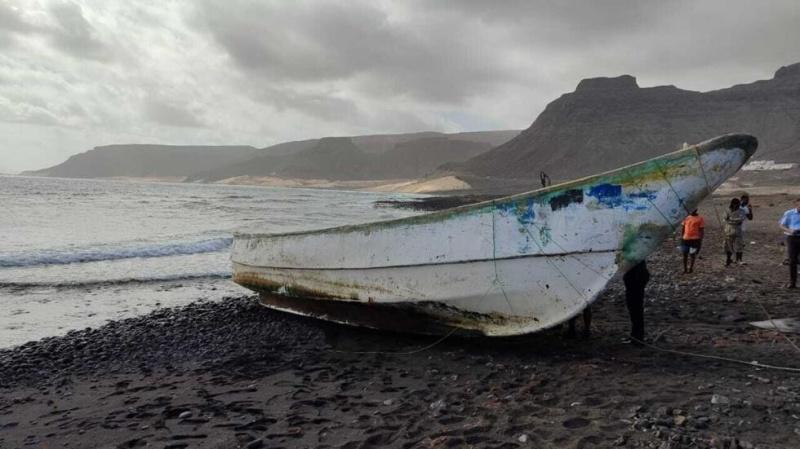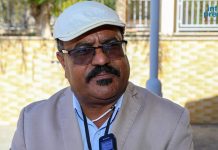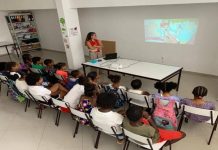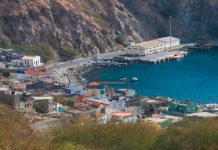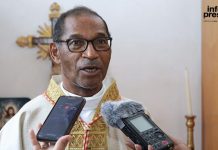By EXPRESSO DAS ILHAS , LUSA
Africa-Press – Cape verde. The island of São Vicente, in Cape Verde, witnessed something unusual: two artisanal boats washed ashore with Africans in search of Europe in less than four days, between Sunday and Wednesday.
Both departed from the port city of Nouadhibou, Mauritania, but with very different stories.
The latter brought 11 men who set sail for four days to the wrong archipelago, while the former only left four survivors who watched the death of the other 60 occupants, day after day, during a month adrift.
The GPS they carried on board recorded just 200 kilometers (out of a total of 800) to their destination, the Canary Islands, on February 11, after four days of travel.
They had run out of food that day, but they were holding on because the end of the trip was in sight when they ran out of fuel.
Due to the wind and tides, they entered a reverse drift that brought hunger, thirst and despair, says Elhadji Sow, from the survivors’ reception team, who heard “horrible reports”.
The survivors had to throw the bodies of those who died, including five women, overboard to prevent decomposition on board.
Other times it was the opposite: “They even tied people up to prevent them from jumping into the sea. They were the ones who no longer had hope and threw themselves in, to escape the mercilessness of the sun and storms, in the open air and drinking salt water, describes Djibril Ndiaye, another member of the reception team.
“One of these survivors has a chain around his chest, a reminder of a friend who died”, but, in Djibril’s opinion, these are all signs of “an incredible trauma”.
“They will need to be closely monitored,” he added.
They say they paid around 700 euros to board and remember that a young man was traveling for free towards the European dream, because he had gotten “a ride, offered by one of the migrants”.At the time, they thought he was lucky.
The Cape Verdean authorities welcomed all 15 surviving men from the two pirogues into the rooms of the Mindelo football training center, under medical and food care, confined and prevented from talking to journalists, at least for now, alleging that the police were carrying out investigations and investigations still ongoing.
Elhadji Sow and Djibril Ndiaye, Senegalese, are part of the African Communities Platform in Cape Verde, used to helping immigrants in trouble and to which civil protection requested support, says Vitória Veríssimo, regional commander.
“They are of different nationalities, with different customs [from Cape Verdeans], some are Muslims who strictly follow their religion” and the association bridges the gap, breaking down the language barrier, including on the phone, with distressed family members.
All four of Sunday’s castaways have already spoken to family members, in Mali and France (some want to go and look for them, but are advised to wait for directions), while the last group of 11 is awaiting authorization from the police.
Many other people who had family members in the pirogue call Sow, who regrets not having good news to share.
In 2023, a total of 39,910 migrants arrived irregularly in the Canary Islands after crossings on precarious boats from the coast of West Africa, an increase of 155% compared to 2022 (15,682 migrants), according to the International Organization for Migration (IOM).
Also last year, there were 47 shipwrecks and 958 deaths or disappearances in the official record of the so-called West African Atlantic route, but the real numbers are higher.
The IOM recognizes that, in countries of origin, there are many clandestine departures, resulting in boats lost in the Atlantic, full of victims invisible in the statistics.
Sow and Djibril hear the motivations for this risky flight to Europe and nothing surprises them anymore: poverty, unemployment, political instability and violence, as in Mali, the country of origin of 13 of the 15 men who arrived in Cape Verde – two others from Mauritania and one from Senegal.
The 11 occupants of Wednesday’s vessel are all from Mopti, a river outpost in central Mali, they got together to buy the motor pirogue with which they took to the sea and when they arrived at Baía das Gatas, in São Vicente, they strolled along the beach and asked if they were in Spain.
They told the authorities that there were more vessels behind them, but since Wednesday there have been no more arrivals in Cape Verde.
In the Portuguese-speaking archipelago, repatriation to their countries of origin awaits them all: will they try to catch another boat to Europe?
“Some don’t, but you can’t say that about everyone,” says Djibril. “In a land where hope is lacking, the possibility of emigrating always arises”, despite the traumas and warnings, he adds.
Migrant boats challenge Cape Verde’s civil protection
The pirogue is a hallmark of fishing on the African coast, but it has gained another media presence in the last two decades, overcrowded, as a common image of irregular migrations to Europe.
About ten meters long and two meters wide, the structure of wood and white fiber is peeling at the edges, has a patch on the bow and appears to accumulate years of wear, just like the wooden beams and boxes in an interior devoid of security. .
A pair of shorts, a bottle of water with a label in Arabic, ropes and nets were left inside the boat that traveled 1,000 kilometers from the port city of Nouadhibou, Mauritania.
“The engine was removed and is in the custody of the maritime authorities”, explained Anilton Andrade, councilor responsible for civil protection, who monitored the operations upon the arrival of the group of 11 occupants, from Mopti, Mali, who spent four days at sea. and, when they arrived, they asked if they were in Spain – in the Canary archipelago.
Three days earlier, another similar vessel, which left the same port, ran aground on the island of São Vicente, in the Calhau area, after a month adrift, with only four of the 65 occupants surviving.
“The first impact [when seeing the vessel] is terrible, seeing people in these conditions”, describes Anilton Andrade, recalling that “there were even dead bodies on the other vessel, several days ago”.
The Cape Verdean authorities believe that the precarious boats are easy prey for the rough seas and strong winds, dragging them off course – the authorities themselves had difficulty putting to sea for search actions on Sunday and wind with gusts from the northwest has not stopped blowing.
Vitória Veríssimo is routinely involved in civil protection activities and took on the role of regional commander a year ago, but this is the first time she has dealt with the rescue and reception of migrants in São Vicente.
“We already had experience of civil protection on other islands” and this is helping, he explains to Lusa, upon entering the Mindelo football training center, the space that was used for isolation during the covid-19 pandemic is the same as where it is now The 15 men who arrived in Cape Verde by Wednesday were transferred.
Blood was collected from everyone for analysis, malaria was detected – Cape Verde was classified free of the disease in January – and covid-19, all with negative results, and a questionnaire was carried out on chronic diseases.
Medical and nursing teams follow them daily and a nutritional plan was established to restore the strength, especially of the four survivors of the first vessel, who after a month adrift, were barely able to move – they went from the beach to the hospital on stretchers. and remained hospitalized for two days.
“In general, some complain of toothaches and headaches, but everyone is recovering. They are very calm, calm people and always collaborate with us”, even when language barriers arise, describes Vitória Veríssimo.
“They are in the rooms under the custody of the National Police while the authorities carry out the necessary steps” which involves contacts with their countries of origin.
“In terms of civil protection, we ensure health, hygiene and talk to them”, he adds, monitoring any need.
From the windows on the second floor, they can watch the football training that the local teams do on the training center’s synthetic turf.
On the ground floor, a Malian businessman residing in Mindelo passes through the center, upon learning of the presence of his compatriots and offers to deliver one of the next meals to them, an example of what the gestures of local entities and individuals have been.
“All civil protection entities and agents in São Vicente are committed to providing the best support possible”, concluded Anilton Andrade.
In addition to the two artisanal boats that ran aground on the island of São Vicente this week, three other cases have been recorded in Cape Verde in the last 16 months.
In November 2022, a boat with 66 Senegalese immigrants washed ashore on the island of Sal.
In January 2023, a pirogue arrived on the island of Boa Vista with 90 African migrants on board, two of them dead.
A boat that left Senegal in July 2023, with 101 people, was found adrift near the island of Sal, Cape Verde, in August, with 38 survivors, assisted and repatriated.
EXPRESSO DAS ILHAS
For More News And Analysis About Cape verde Follow Africa-Press

